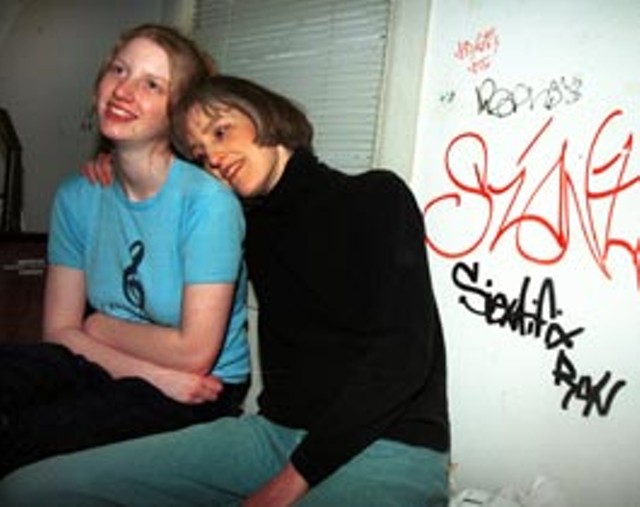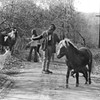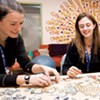Published February 28, 2001 at 8:06 p.m. | Updated November 7, 2017 at 12:32 p.m.
In ninth grade, Chloe Montgomery went from being an honor roll student at Burlington High School to flunking English. “She started skipping classes and not participating when she was there,” says her mother, Colleen. “Her teachers told us, ‘The lights are on, but nobody’s home.’”
That description would prove prophetic during the next three years, a period when the lights were on at the Montgomery’s spacious Hill section house but Chloe was frequently missing. As her parents grew increasingly frantic, the teenager fell into a pattern of staying out all night or disappearing for days at a time.
“She would say, ‘I’m not a kid any more, so stop treating me like one,’” Colleen recalls. “We just wanted to know where she was going at night and if she was safe.”
It’s an all-too-familiar story for parents of teens, made more poignant by the January murder of Crystal Jones, a 16-year-old Burlington runaway apparently caught up in a New York-based heroin-and-prostitution ring.
“This generation is collapsing,” observes Chloe’s father, Doug Montgomery, a Colchester native who owns Speeder and Earl’s Espresso Bar on Church Street. And the statistics suggest he may be onto something.
Between October 1999 and September 2000, Spectrum Youth and Family Services provided shelter for 306 local teenagers, and that might only represent “50 percent of the total runaways or homeless kids out there,” suggests Will Rowe, executive director of the Burlington agency. “Vermont is right on the mark with nationwide figures.”
The dilemma, he says, “hits every income bracket. With all the publicity about Crystal Jones, it’s been made to look like this is an SRS problem. In my view, SRS represents only 15 percent of vulnerable teens.”
Indeed, the Montgomerys are solidly middle-class. Colleen, a certified public accountant, only chose to go public with her harrowing saga because she was bothered by letters to the editor in The Burlington Free Press insinuating that troubled teens come from dysfunctional families. “You can’t always figure out what makes a kid go off,” she insists. “It’s not fair to blame Crystal Jones or her mother or social services. It isn’t necessarily anyone’s fault. We went to all the PTO meetings. We were doing the best we could.”
Rowe says that conflict with parents drives most young people in crisis. For the Montgomerys, the problem stemmed from a mother-daughter struggle for identity. “Chloe told the counselors we consulted, ‘Mom is the cause of all my problems. I just can’t stand to be around her,’” Colleen says. This from the child who had once been “like a little ray of sunshine, always smiling, always sitting on my lap,” she adds.
Can anyone accurately pinpoint what, apart from raging hormones, motivates the proverbial rebel without a cause? Can outsiders ever really understand the complex anatomy of a family in turmoil? Even as the Montgomerys grapple with their memories of Chloe’s disaffection, there are Rashomon-like layers of truth.
At 18, Chloe is now finally transcending the peril and sorrow of her early adolescence, a time when she was desperate to be free of parental influence. Colleen and Doug were desperate to save her from herself.
As Chloe sits next to her mother on the couch in their cavernous living room, it’s obvious the two share the same gene pool: Both are tall, thin and fair with luminous complexions and expressive eyes. They point out that Molly, Chloe’s older sister now living in Massachusetts, has dark hair like her father. Both of them are beanpoles, too.
These people clearly love each other, but love was not the issue in Chloe’s ragged attempts to assert her independence by running away and defying authority. When she did stay home during her high school years, the tension level always escalated. “Some-where in there she began smoking marijuana,” says Colleen, who had always maintained a hands-on role in her children’s education. “She didn’t care about doing her homework when she was stoned.”
The more Colleen intervened, the more recalcitrant the girl became. “She’d tell me to do my homework, so I wouldn’t — of course,” says Chloe, with a smile that hints she’s both chagrined and slightly amused by the errant behavior that still vexes Colleen.
One night, when Chloe didn’t come home after school, her parents soon realized she had packed a bag and moved out. She was found hiding with a friend in the locker room at the Y, her strawberry-blonde hair dyed black and her right eyebrow pierced.
The family began what would turn out to be years of counseling and therapy sessions. “One of the counselors told me, ‘You’ve already passed algebra,’” says Colleen, who then vowed to stop imposing her own study habits on Chloe. “I agreed to back off. We made a contract with her not to mention homework. We stuck to our end of the deal. Chloe didn’t.”
Part of Chloe’s revolt stemmed from the fact that Molly had always been an academic achiever. Now 24, she’s a graduate of prestigious Wellesley College and working as a computer whiz for a high-tech firm in Cambridge.
“When we were little, my sister would be doing her homework and I’d be, like, ‘I want to go play,’” Chloe says. “We didn’t get along at all. We still don’t.”
Colleen sighs. “Chloe always said, ‘I want to be different than Molly.’ They had a five-year age difference and virtually were never in the same school together, so they were civil to each other but not close.”
Sibling rivalry probably compounded the situation, but Chloe acknowledges that a suspected learning disorder, which is still undiagnosed, might also have been a factor in her rebellion. “I’m not a good reader. I have some sort of vowel dyslexia. In middle school, they tried to stick me in special ed,” she says with disdain.
Chloe was adamant about not wanting to be tested, and Colleen let her have her way —a decision she now regrets in light of her daughter’s life-long difficulty with spelling and reading.
The child also was outspoken about her desire to remain unfettered by parents she saw as overprotective. When Colleen acknowledges being “a little bit of a control freak,” Chloe punctuates her energetic nod with a resounding, “Yup!”
“In her first week of tenth grade, Chloe got suspended — and it wasn’t even September yet,” Colleen says, referring to a 1997 incident in which school authorities found a marijuana pipe in Chloe’s backpack.
A short time later, she was given an “in-school” suspension for skipping classes. It landed her in a room for the day with other “delinquents.”
That semester, Colleen discovered a razor, a mirror and white powder in Chloe’s backpack. The substance she had been snorting turned out to be Ritalin rather than cocaine, but Chloe agreed to participate in a workshop at Spectrum on the dangers of various drugs.
When mother and daughter talk about these events now, it can sound like the script for a play or movie:
Colleen: “Her grades were very mediocre at this point and, on many nights, we weren’t sure where she was.”
Chloe: “When I came home, she was the one doing the yelling. My dad would just shake his head.”
Colleen: “Chloe would tell me, ‘How can you possibly understand me, Mom? We have nothing in common.’ I never felt the need to rebel.”
Chloe, shaking her head in disbelief: “When you were a teenager, you had to be forced to go to a Beatles concert — forced! It’s just weird.”
After a brief protest, Colleen returns to the subject of their recent difficulties. “We went through a series of counselors,” she says.
“I didn’t trust any of them,” Chloe responds.
“We told her, ‘As soon as you turn 18, if you’re going to hang out on Church Street and get stoned in City Hall Park, we’re kicking you out of the house,’” Colleen continues. “She wasn’t moving forward. It was a way of protecting ourselves from being abused. We had to draw some barriers, so as not to be sucked dry by her.”
Chloe looks a bit surprised to hear this description. She mumbles something about “feeling bad when I realized I’d hurt them,” after Colleen mentions her anguish during the years of estrangement.
Kids often seem egocentric, interested only in their peers. It can be difficult for them to feel much empathy for adults. Yet, when Colleen learned that her best friend had committed suicide in 1998 while the Mont-gomerys were in their own private hell, Chloe briefly set aside her sense of alienation to demonstrate true compassion. “She was there for me,” her mother notes with appreciation.
As challenging as tenth grade had been, Chloe’s junior year in high school “was the real horror show,” Colleen says. “She was picked up by the police for smoking grass on the steps of City Hall in late September 1998. The next morning, she and a friend just went missing for five days.” Colleen talked to the other kids hanging out downtown, contacted the police, and posted photocopied fliers with her picture on them. “I put up big signs in the park asking her to come home,” she adds. “Finally, someone called to say they had seen her.”
That someone was a fellow who goes by the name of Highway. “He’s a roadie who does security for rock bands and tries to watch out for kids not to get hurt or in trouble,” Chloe says. “He looks like a Hell’s Angel, with a lot of tattoos.”
Highway, 39, is a Burlington resident by way of New Jersey who befriends kids on the street. He doesn’t work for any of the local social service agencies, but believes it’s his mission to be a big brother for young people going through hard times. “Because I’m a lot older, I’ve made the mistakes they’ve made or will make. Been there, done that. I tell them, ‘Life is full of choices. Don’t make a bad one.’”
Highway sees Chloe as “a good, solid kid who needed to inspect herself from the inside. Maybe she had a chance to do that when she split.” It’s not easy being a teenager in “the Naughties,” he laments, referring to all those zeroes — a.k.a. the “aughts” — in the year 2000 and beyond.
When Chloe returned home from that first escape, Colleen recalls that “she curled up in a fetal position for days and cried.” But what Chloe calls “my first nervous breakdown” did not necessarily put an end to her restlessness.
“About a month later, she left again but arrived home one day to get clean clothes. I confronted her: ‘This house is a home, it’s not a closet. Either you’re part of this family or you’re going to have to fend for yourself.’ She took off, and we changed the locks on the doors,” Colleen says, her no-nonsense voice betrayed by a face still visibly pained from the tough-love experience.
During this period, Colleen dropped off a note at school to ask Chloe if she wanted to come along on a visit to her great-grandmother, who was near death in a Massachusetts nursing home. She did. “For us, I’d say that was the beginning of a healing,” Colleen suggests.
In the late fall of 1998, Colleen decided to permit Chloe to drop out of high school and enroll full-time in the graphic design program she’d already begun at Burlington Technical Center. “She excelled there,” Colleen says simply.
To help keep tabs on their daughter, the Montgomerys had been allowing her to bring friends home overnight. In the gracious, century-old converted carriage house where Colleen herself was raised, Chloe’s former bedroom sometimes became party central. Now bereft of furniture, it remains a chilling reminder of that era, with graffiti-covered walls on which someone once scrawled a telling message: “High Chloe.”
“After Christmas 1998, there was one more time when she took off for a few days,” Colleen says. “We were roaming the streets, in a car, looking for her. She was clearly distraught when she came home, spending hours on the couch sobbing. Something traumatic had happened.”
Chloe has never told her mother what that “something” was. “It took me a long time to get over that,” the young woman says, looking away as her eyes well up with tears. “I don’t want to talk about it.”
A lot of subjects remain off limits with Chloe, who appears embarrassed but somewhat defiant when declining to discuss where she went during her three big disappearances. “I wanted to be independent and live on my own — and get out of Burlington,” she explains.
A major epiphany came when the Montgomerys agreed to provide shelter for one of Chloe’s friends. The plan was that this girl, from a physically abusive home, would only stay long enough to save money for an apartment — a tenuous arrangement considering she had dropped out of school and was having difficulty finding a job.
“Her boyfriend was supposedly an ex-junkie,” Chloe explains. “One night, I saw him shooting up on our front porch. She took advantage of us.” It gave her a whole new perspective.
“It was like Chloe looking at her future,” Colleen says, turning to her daughter. “I truly believe we got you back because of her being here.”
In retrospect, Chloe doesn’t feel guilty or ashamed, although “I wish I’d let my mother know I was okay. I had to leave to figure things out. It would have been better if I told her that in a way she could accept.”
As a senior from fall 1999 until June 2000, Chloe studied at Richard Milburn High School, the new Burlington alternative educational experience for at-risk kids. “I wanted a diploma. I wanted to learn things,” she says. “You know how people say, ‘I met that one teacher who changed my life.’? Mr. [Bob] Berkel was that for me. He got me motivated to read and think about stuff. I graduated third in my class. At the ceremony, I had the loudest cheer.”
Meanwhile, she was holding down a job with increasing responsibility at Anything’s Pastable, where the staff offered her support and encouragement. Now employed as a technician at Vermont Color Photo Labs, Chloe hopes to take photography and writing courses at Burlington College in the fall. “I want to make coffee-table books,” she says, adding that her hometown seems much more inviting after a disastrous relocation last summer to Colorado for a job that never materialized.
These days, Chloe finds comfort in the fact that her mother persisted. “I grew up and became closer to her. Now I call her all the time — ‘Mom, I’m bored,’” she says, sharing a laugh with Colleen that indicates a new-found delight in each other’s friendship.
This bond helps Colleen recover from the residual heartache. “She’s now the kid we always wanted — with just a few anomalies — but I had to learn to let go.”
Letting go was an excruciating process. “It was a very dark time. I kept pursuing different possibilities: things I hadn’t yet tried. Other parents I hadn’t yet talked to. Counselors we hadn’t yet found. It was only those moments when I ran out of ideas that I was the most alarmed.”
Frightened that Chloe would “make one mistake too many because she didn’t understand how vulnerable she was,” Colleen says that nonetheless “I knew that deep inside there was a lot of good sense” in her.
And a good dose of caution as well. “My fear kept me from going too far,” Chloe surmises.
Doug Montgomery, whose reluctance to talk publicly about family matters prompted him to avoid the living-room conversation, later echoes that assessment during a telephone call. “I never, ever lost the feeling that she’d survive her adolescence, that she’d be just fine. I clung to that. It certainly tested me,” he says.
Doug believes the family is stronger for having been through the wringer together. “We’re good friends. We like each other.” He admits, however, that he still can’t quite understand why Chloe did what she did.
Colleen speculates, “It’s the romance of living on the edge.” Teens, she says, “have no sense of mortality.”
Perhaps a more realistic perspective has set in since the death of Crystal Jones — an acquaintance of Chloe’s — which served as a powerful wake-up call in the community.
Chloe was shocked and saddened by the news. She called a friend who had been her partner in misadventure to commiserate about the tragedy.
“It could have been any of us. We were, like, this much smarter than her,” Chloe says, putting her thumb and forefinger close together to illustrate the narrow margin between life and death.
More By This Author
Speaking of...
-

Burlington Budget Deficit Balloons to $13.1 Million
Apr 25, 2024 -

The Café HOT. in Burlington Adds Late-Night Menu
Apr 23, 2024 -

Burlington Mayor Emma Mulvaney-Stanak’s First Term Starts With Major Staffing and Spending Decisions
Apr 17, 2024 -

Totally Transfixed: A Rare Eclipse on a Bluebird Day Dazzled Crowds in Northern Vermont
Apr 10, 2024 -

Middlebury’s Haymaker Bun to Open Second Location in Burlington’s Soda Plant
Apr 9, 2024 - More »
Comments
Comments are closed.
From 2014-2020, Seven Days allowed readers to comment on all stories posted on our website. While we've appreciated the suggestions and insights, right now Seven Days is prioritizing our core mission — producing high-quality, responsible local journalism — over moderating online debates between readers.
To criticize, correct or praise our reporting, please send us a letter to the editor or send us a tip. We’ll check it out and report the results.
Online comments may return when we have better tech tools for managing them. Thanks for reading.











































